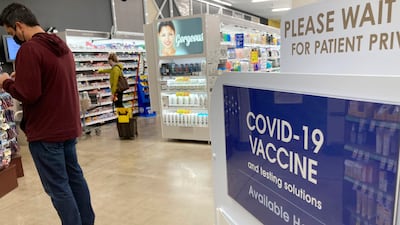US regulators on Friday opened up Covid-19 booster shots to all adults, expanding the government’s campaign to shore up protection and control rising coronavirus cases that may worsen with upcoming holidays.
Centres for Disease Control and Prevention Director Dr Rochelle Walensky signed off on guidance that opens booster eligibility to all adults who received a second dose of a messenger RNA vaccine from Pfizer or Moderna at least six months earlier.
The latest action simplifies what until now has been a confusing list of who is eligible by allowing anyone 18 or older to choose either company’s booster six months after their last dose — regardless of which vaccine they had first.
Dr Walensky said that boosters are “an important public health tool to strengthen our defences against the virus as we enter the winter holidays".
At least 10 states and New York City had already begun offering boosters to adults.
The move came after a CDC independent advisory unanimously voted on Friday afternoon to recommend expanding eligibility. The Food and Drug Administration signed off on it earlier.
Moderna chief
Tens of millions more Americans now can have three doses of protection before the new year.
Anyone who received the one-dose Johnson & Johnson vaccine already has access to a booster.
All three Covid-19 vaccines used in the US still offer strong protection against severe illness including hospital admission and death, but protection against infection can wane with time.
Previously, the government had cleared boosters of Pfizer and BioNTech’s vaccine as well as the Moderna vaccine but only for vulnerable groups including older Americans and people with chronic health problems.
The move to expand comes as Covid-19 cases have climbed steadily over the past two weeks, especially in states where colder weather is driving people indoors.
Sparked by these worrying trends, some states did not wait for federal officials to act. Utah and Massachusetts were the latest states to announce that they are opening boosters to all adults.
Boosters for everyone was the Joe Biden administration’s original goal. But in September, a panel of FDA advisers voted overwhelmingly against that idea based on the vaccines’ continued effectiveness in most age groups.
Instead, they endorsed an extra Pfizer dose only for the most vulnerable.
Since then, administration officials have continued making the case for using boosters more widely, noting that even milder infections in younger people can cause “long Covid” and other complications.
Last week, Pfizer and its German partner BioNTech filed new data to make the case that boosters could help tamp down infections at a critical period.
The CDC says 15 per cent of fully vaccinated people in the US have received a booster shot. A total of 70.6 per cent of US adults have been fully vaccinated.
People who are not considered vulnerable due to their age, occupation, health status or living conditions have still been able to receive booster shots as many vaccine providers do not check qualifications.
The FDA previously ruled that it was possible for people to mix brands of vaccines when receiving a booster.
Some experts worry that all the attention on boosters may harm efforts to reach the 60 million Americans who are eligible for vaccinations but have not received the shot.
There is also growing concern over how rich countries are offering widespread boosters when poor countries have not been able to vaccinate more than a fraction of their populations.
The US on Monday said that it is planning to invest billions of dollars in manufacturing Covid-19 vaccines with the aim of producing at least one billion doses a year beginning in the second half of 2022.
“In terms of the number one priority for reducing transmission in this country and throughout the world, this remains getting people their first vaccine series,” said Dr David Dowdy of Johns Hopkins Bloomberg School of Public Health.
Agencies contributed to this report















